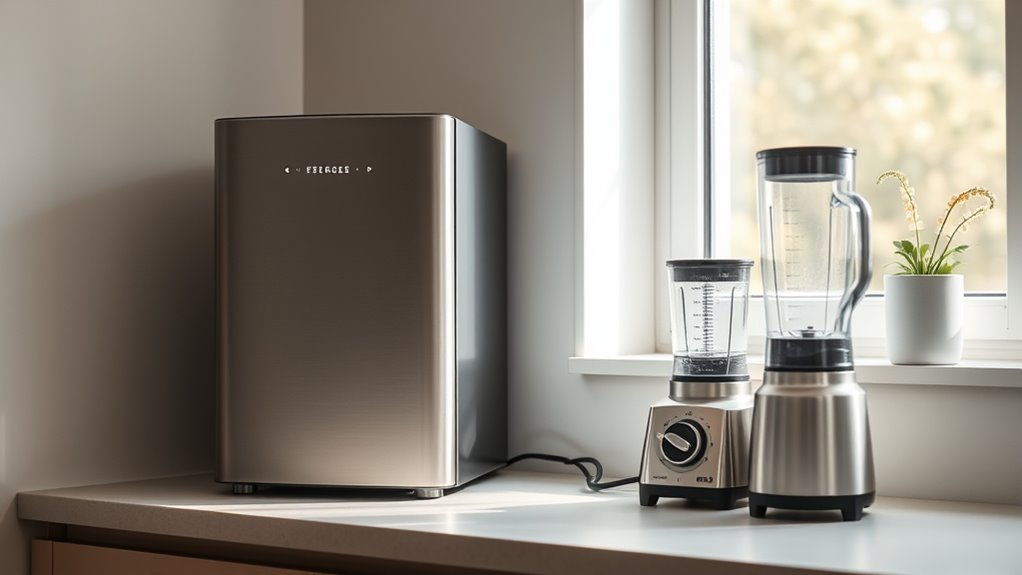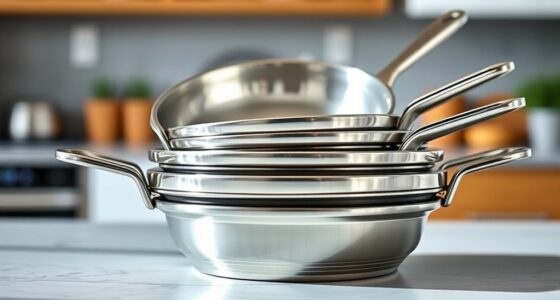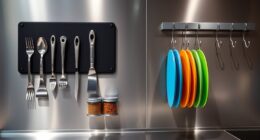To save electricity without losing functionality, choose energy-efficient small appliances with high ratings like Energy Star. Look for models with adjustable settings, smart sensors, and eco-friendly features that optimize power use while maintaining performance. Proper maintenance and smart placement can further boost efficiency and lifespan. Modern appliances often include automation and real-time monitoring, making it easier to reduce consumption without sacrificing convenience. Keep exploring to discover more tips for sustainable living.
Key Takeaways
- Choose appliances with high energy efficiency ratings, such as Energy Star-certified models, to reduce power consumption without losing performance.
- Utilize smart features like adaptive controls and sensors to automatically optimize energy use based on need.
- Regularly maintain and clean appliances to ensure they operate efficiently and extend their lifespan.
- Select compact, low-power devices designed for efficiency, such as inverter refrigerators and portable chargers.
- Integrate appliances into smart home systems for centralized control, scheduling, and real-time energy monitoring.
Understanding Energy Efficiency Ratings for Small Appliances

Understanding energy efficiency ratings for small appliances is essential because these ratings help you compare how much energy different models consume. They provide clear insights into a device’s power consumption metrics, allowing you to choose appliances that save energy and lower your bills. Higher efficiency ratings often mean the appliance is designed with better technology, which can also contribute to improved appliance durability over time. When evaluating small appliances, look for standardized labels like Energy Star, which highlight models that meet strict energy-saving criteria. Remember, a more efficient appliance might cost a bit more upfront but can offer long-term savings through reduced energy use. Additionally, vertical storage solutions can help organize your appliances efficiently, reducing clutter and making it easier to access and operate them. By understanding these ratings, you make smarter choices that balance performance, longevity, and energy consumption.
Top Compact Appliances Designed for Low Power Consumption

When shopping for small appliances that won’t spike your energy bills, focusing on those designed for low power consumption can make a big difference. Portable chargers are a great example—they’re efficient, quick to recharge, and use minimal electricity, making them perfect for travel or emergency backups. Compact refrigerators also rank high on energy efficiency; newer models use less power while still keeping your food fresh. Look for appliances with high energy ratings and energy-saving features, like inverter technology or eco modes. These appliances maintain their function without wasting electricity. Choosing lightweight, space-saving devices ensures you don’t sacrifice convenience for efficiency. Additionally, selecting appliances with performance upgrades that enhance energy efficiency, such as improved compressors or optimized power management, can further reduce energy consumption. By selecting these low-power options, you save energy and reduce your utility bills without compromising on performance.
Features to Look for When Choosing Eco-Friendly Devices

When selecting eco-friendly appliances, look for models with Energy Star certification to verify they meet energy efficiency standards. Adjustable power settings give you greater control over energy use and help reduce waste. These features make it easier to choose devices that are both environmentally friendly and cost-efficient. Additionally, energy-efficient small appliances often incorporate advanced technology that further minimizes power consumption during operation.
Energy Star Certification
Ever wonder how to identify small appliances that are truly energy-efficient? Look for the Energy Star certification—it’s a reliable indicator of appliances designed to save energy without sacrificing performance. Energy Star-rated devices meet strict standards for appliance design that optimize energy use while maintaining user convenience. These appliances often include features like efficient motors, smart sensors, and better insulation, all aimed at reducing power consumption. Choosing Energy Star-certified products ensures you’re making an eco-friendly choice that doesn’t compromise functionality. Plus, certified appliances are tested for durability and reliability, giving you confidence in your purchase. By prioritizing Energy Star, you can cut down on electricity bills and support sustainable living effortlessly. Research shows that personality traits can influence the way consumers select and use energy-efficient appliances, making awareness of personal preferences beneficial for eco-conscious decisions.
Adjustable Power Settings
Adjustable power settings are a key feature to contemplate if you want to use appliances more efficiently. They allow you to tailor energy consumption to your needs, reducing waste without sacrificing performance. With adjustable power, you can lower energy use during lighter tasks and boost it when necessary. This flexibility helps save electricity and extends the appliance’s lifespan. When choosing eco-friendly devices, look for models that offer multiple power levels or modes. These features make it easier to optimize energy consumption based on your usage patterns. By actively managing power settings, you can enjoy the same functionality while minimizing your environmental impact. Additionally, selecting devices with proper maintenance can further enhance their efficiency and longevity.
Benefits of Using Energy-Efficient Small Appliances

Using energy-efficient small appliances can considerably cut your power bills and save you money over time. They also help reduce your environmental impact by consuming less energy. Plus, they often last longer, giving you better value and reliability. Incorporating automation through smart appliances can further optimize energy usage and enhance convenience.
Lower Energy Costs
By choosing energy-efficient small appliances, you can substantially reduce your monthly electricity bills. They consume less power while delivering the same performance, saving you money over time. Plus, many models qualify for rebates or discounts, further lowering costs. These appliances often feature smart functions that optimize energy use, making your home more efficient. To maximize savings, consider participating in recycling initiatives that promote proper appliance disposal, reducing waste and supporting sustainability. Proper recycling not only extends the life cycle of appliances but also ensures hazardous materials are handled safely. Additionally, replacing outdated devices with energy-efficient ones can decrease your overall appliance disposal needs, cutting down on environmental impact and long-term expenses. Incorporating energy-efficient design features into your appliance selection can further enhance your home’s sustainability. Lower energy costs become easier when you choose smarter, more sustainable appliances.
Environmental Impact Reduction
Have you ever considered how small changes in your appliance choices can substantially benefit the environment? Using energy-efficient small appliances reduces your overall energy consumption, which helps lower your carbon footprint. When appliances consume less electricity, they also lessen the demand for energy generated from fossil fuels, which are a major source of greenhouse gases. Additionally, energy-efficient appliances are often designed to work seamlessly with renewable energy sources like solar or wind power, further reducing environmental impact. By making smarter choices, you contribute to cleaner air and help conserve natural resources. These appliances not only save energy but also promote a more sustainable lifestyle, making it easier for you to live environmentally responsible without sacrificing the functions you need.
Enhanced Appliance Longevity
Choosing energy-efficient small appliances not only benefits the environment but also extends their lifespan. When you select models made from eco friendly materials and undergo rigorous durability testing, you’re investing in appliances that last longer. These appliances are designed to withstand daily wear and tear, reducing the need for frequent replacements. By prioritizing durability, you save money and reduce waste. Plus, energy-efficient models tend to have better build quality, which translates into enhanced longevity. Regular maintenance and choosing products with high durability ratings further boost their lifespan. Additionally, advancements in machine learning technology are being integrated into appliance design to predict and prevent potential failures, further extending their operational life. With these smart choices, you enjoy reliable performance over time while contributing to a healthier planet.
Tips for Maximizing Performance While Saving Electricity

To maximize your small appliance’s performance while saving electricity, it’s vital to operate them efficiently and maintain them properly. Keep appliances clean and well-maintained to prevent excess appliance noise that can indicate inefficiency. Use the correct settings for each task to avoid overusing energy. When selecting new appliances, consider color options that blend seamlessly with your decor, reducing the temptation to hide or ignore them. Proper placement also helps; avoid crowded or obstructed spaces, which can hinder airflow and increase energy consumption. Regularly check and replace filters or worn parts to guarantee ideal functioning. Additionally, understanding relationship dynamics can help you better recognize when your appliances and environment are optimized for efficiency, promoting a more harmonious and energy-conscious household. By staying attentive to these details, you boost performance, extend appliance lifespan, and save electricity—all without sacrificing the convenience and style you want.
Innovative Technologies Enhancing Appliance Efficiency

Smart sensors automatically adjust appliance settings based on your usage, saving energy without sacrificing performance. Advanced power management techniques further reduce unnecessary energy consumption during idle or low-demand periods. Together, these technologies make your small appliances more efficient and eco-friendly. Incorporating tuning techniques used in automotive modifications can inspire innovative ways to optimize appliance performance and energy savings.
Smart Sensors Optimize Usage
Innovative smart sensors are transforming how small appliances operate, making them more efficient and responsive to your needs. These sensors detect motion, temperature, or water levels, allowing appliances to adapt their operation for *ideal* energy use. By integrating smart sensors, your devices can perform usage optimization, reducing unnecessary power consumption without sacrificing performance. This technology ensures appliances activate only when needed and adjust settings based on real-time conditions. You’ll notice less waste and lower energy bills, all while enjoying the same functionality. Smart sensors help prevent overuse and extend appliance lifespan by avoiding constant operation. Overall, they make your small appliances smarter, more efficient, and better suited to your lifestyle. Advanced sensor technology can also be integrated with Kia Tuning systems to optimize vehicle performance and efficiency, demonstrating the versatility of smart sensor applications.
Advanced Power Management
Advanced power management systems are revolutionizing how small appliances use energy by intelligently controlling their operation based on real-time data and usage patterns. These systems optimize performance, extending battery life and reducing waste. They adjust power levels dynamically, ensuring appliances operate only when needed. This not only conserves electricity but also minimizes noise, creating a quieter environment. For example, smart thermostats and vacuum cleaners adapt their activity to your schedule, conserving energy without sacrificing function. Here’s a quick overview:
| Feature | Benefit | Impact |
|---|---|---|
| Battery Optimization | Extends device runtime | Reduces charging frequency |
| Noise Reduction | Quieter operation | Enhances comfort |
| Intelligent Scheduling | Efficient energy use | Saves electricity |
| Usage Pattern Learning | Tailors operation to needs | Improves efficiency |
| Power Scaling | Adjusts power based on demand | Lowers energy consumption |
Additionally, some systems incorporate feedback mechanisms to learn from user behavior and further refine their energy-saving strategies.
Comparing Traditional and Modern Energy-Saving Devices

While traditional energy-saving devices like basic timers and low-wattage bulbs have helped reduce energy consumption, modern devices incorporate smarter technology to optimize efficiency even further. Modern devices often feature sensors, adaptive controls, and connectivity that improve device compatibility and energy management. They can automatically adjust settings based on usage patterns, saving more electricity without sacrificing function. Proper sizing and placement play a crucial role in maximizing energy savings and device effectiveness. Compared to traditional options, these advancements deliver better performance and smarter energy use. You benefit from lower bills and a greener footprint while maintaining the same level of convenience. Modern devices also tend to be more durable and easier to integrate into existing systems, making them a smarter long-term investment. Here’s what sets them apart:
- Real-time energy monitoring
- Automated adjustments
- Compatibility with smart home systems
- Longer lifespan
- Enhanced user control
Practical Ways to Incorporate Small Appliances Into a Sustainable Home

Incorporating small appliances into your home can substantially boost your sustainability efforts, especially when you choose energy-efficient models with smart features. Opt for appliances that support recycling electronics, ensuring that outdated or broken devices are disposed of responsibly. This practice helps reduce e-waste and promotes eco-friendly practices. When selecting new appliances, consider appliance color options that match your decor; choosing neutral or eco-friendly finishes can encourage reuse and reduce the impulse to replace items frequently. Additionally, integrating multi-functional devices minimizes clutter and conserves resources. You can also look for appliances with eco-labels and certifications, which indicate energy-saving capabilities. Ensuring proper wood stove safety standards and regulations in your home further enhances overall safety and efficiency. By being mindful of these practical steps, you make sustainable choices that save electricity without sacrificing the functionality you need daily.
Maintenance and Usage Tips to Extend Appliance Lifespan

Regular maintenance and mindful usage are key to extending the lifespan of your small appliances. Proper appliance cleaning prevents dust buildup and guarantees peak performance. Always follow manufacturer guidelines for cleaning and avoid harsh chemicals. Be conscious of warranty considerations—using appliances beyond their recommended capacity or ignoring maintenance advice can void coverage. Regularly inspect cords and plugs for damage, and unplug devices when not in use. Keep vents and filters clean to prevent overheating. Store appliances properly when not in use to avoid unnecessary wear. Additionally, avoid overloading or misusing appliances, which can cause early failure. Proper care saves money and energy, helping your appliances last longer without sacrificing function. Monitoring toilet maintenance and repairs can prevent costly issues and extend the life of your fixtures.
Future Trends in Energy-Efficient Home Technologies

Advancements in smart technologies and renewable energy sources are shaping the future of energy-efficient home appliances. You’ll see appliances that seamlessly integrate with the smart grid, optimizing energy use based on demand and availability. These innovations enable your devices to harness renewable energy, reducing reliance on fossil fuels. Expect features like real-time energy monitoring, adaptive operation, and automated scheduling to save electricity without sacrificing performance. The following table highlights key trends:
| Trend | Description | Benefits |
|---|---|---|
| Smart grid integration | Appliances communicate with the grid for efficiency | Lower energy costs, better load management |
| Renewable energy use | Devices powered by solar, wind, or other renewables | Reduced carbon footprint |
| AI-powered optimization | Learning systems adapt to usage patterns | Maximize savings and performance |
| Connected home systems | Centralized control via apps | Convenience and energy management |
These trends make your home smarter, greener, and more sustainable. Additionally, the integration of energy management systems can further enhance overall efficiency by coordinating multiple appliances for optimal operation.
Frequently Asked Questions
How Do I Verify the Actual Energy Savings of Small Appliances?
To verify your small appliances’ actual energy savings, start with power consumption measurement using a wattmeter or energy monitor. Conduct real-world testing by using the appliance as usual over a week, recording energy use each day. Compare these results to the manufacturer’s labels or previous usage data. This hands-on approach helps you see true savings, ensuring you’re making informed, energy-efficient choices without sacrificing performance.
Are There Specific Brands Known for Their Eco-Friendly Small Appliances?
Imagine finding brands so eco-friendly, they practically save the planet with every use! Look for appliances with eco-friendly certifications like Energy Star or EPEAT, which guarantee sustainable manufacturing. Companies like Whirlpool, Samsung, and LG often feature eco-conscious lines committed to reducing environmental impact. These brands prioritize sustainability, ensuring you get powerful, efficient appliances that don’t harm the planet—so you can feel good about your choices while staying eco-friendly!
Can Energy-Efficient Appliances Handle Heavy or Continuous Use Tasks?
When considering if energy-efficient appliances can handle heavy or continuous use, you should think about durability concerns and maintenance requirements. These appliances are designed for efficiency, but some might not withstand constant use as well as traditional options. To guarantee longevity, follow the manufacturer’s maintenance instructions and choose models with good reviews on durability. This way, you get energy savings without sacrificing performance or risking frequent repairs.
What Are the Initial Costs Versus Long-Term Savings of Eco-Friendly Appliances?
When you compare costs, eco-friendly appliances often have higher initial prices, but they offer significant long-term savings through reduced energy bills. This cost comparison highlights a smart investment return, as you save money over time. Though the upfront cost might seem steep, the energy efficiency and durability of these appliances make them a financially wise choice, benefiting both your wallet and the environment.
How Can I Ensure Safety When Using Energy-Efficient Small Devices?
To guarantee safety when using energy-efficient small devices, you should prioritize fire safety and electrical compatibility. Always read and follow the manufacturer’s instructions carefully, ensuring the appliance matches your outlet’s voltage and amperage. Keep devices away from flammable materials, unplug them when not in use, and regularly inspect cords for damage. Using certified products and avoiding overloading outlets also helps prevent electrical hazards, keeping your home safe.
Conclusion
Switching to energy-efficient small appliances can cut your electricity bills by up to 30% and reduce your carbon footprint. With more than 60% of household energy used by everyday devices, making smarter choices truly matters. By choosing eco-friendly options and maintaining them well, you not only save money but also contribute to a healthier planet. Start small today—your wallet and the environment will thank you for it.









